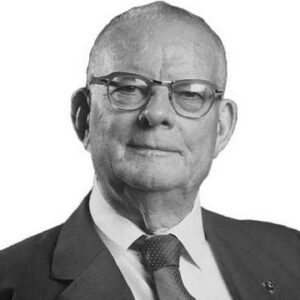W. Edwards Deming was a statistician, professor, author, lecturer, and consultant from the United States. For the US Census, he devised new quality-control methodologies and sampling strategies. He was then appointed to the five-member Emergency Technical Committee, which was tasked with compiling the American War Standards. He is primarily recognized for his post-World War II work in Japan. He educated top corporate executives on how to use numerous approaches, including statistical methodologies, to improve service, product quality, testing, and sales. He was granted Japan’s Order of the Sacred Treasure, Second Class in 1960 for his contribution to the Japanese economy, which made him somewhat of a hero in Japan. He also received the National Medal of Technology and the National Academy of Sciences’ Distinguished Career in Science award. He founded the W. Edwards Deming Institute in Washington, D.C., around the time of his death, and the Deming Collection at the US Library of Congress houses a comprehensive audio and videotape collection. The Institute’s mission is to enhance business, success, and harmony by promoting awareness of the Deming System of Profound Knowledge.
Childhood and Adolescence
William Edwards Deming was born in Sioux City, Iowa, to William Albert and Pluma Irene Edwards on October 14, 1900. His mother was a piano instructor and his father was an insurance agent and lawyer.
His parents were well-read; his father had studied mathematics and law, and his mother was a skilled singer from San Francisco, which is why they placed such a high value on Deming’s education.
Deming began his schooling in 1917 at the University of Wyoming, then went on to the University of Colorado, and finally Yale University, where he earned a Ph.D. in Mathematical Physics.
Career of William Edwards Deming
Deming adapted ‘Statistical Method from the Viewpoint of Quality Control,’ a series of lectures given by Walter A. Shewhart of the Bell Telephone Laboratories at USDA, into a book released in 1939.
He devised the sampling techniques that were employed for the first time during the 1940 U.S. Census the following year, forming the Deming-Stephan algorithm for iterative proportional fitting in the process.
He was appointed to the five-member Emergency Technical Committee to assist in the preparation of the American War Standards and to teach statistical process control techniques to wartime workers.
Deming became a professor of statistics at New York University’s graduate school of business administration in 1946. He was involved in early planning for the 1951 Japanese Census the following year.
He joined the Japanese Union of Scientists and Engineers (JUSE) in 1950 and began teaching hundreds of engineers, managers, and academics about statistical process control (SPC) and quality ideas.
In 1960, Japan’s Prime Minister (Nobusuke Kishi) gave Deming the Order of the Sacred Treasure, Second Class. Deming’s contributions to Japan’s economic recovery and global accomplishments are recognized in the medal’s quotation.
Deming returned to America and started his own consulting firm in Washington, D.C. In 1980, he was featured in an NBC television documentary called ‘If Japan can…Why can’t we?’ His skills were in high demand as a result of this.
In 1981, he was employed by John. A. Manoogian, Ford Motor Company’s newly appointed Division Quality Manager, to assist the company in increasing sales. Ford became the most profitable American auto manufacturer in 1986 because of Deming’s discoveries.
The MIT Center for Advanced Engineering released Deming’s book ‘Quality, Productivity, and Competitive Position’ in 1982, and it was later renamed ‘Out of the Crisis.’
The W. Edwards Deming Institute for the Improvement of Productivity and Quality was formed in 1982 by Deming, Paul Hertz, and Howard Gitlow of the University of Miami Graduate School of Business in Coral Gables.
In 1988, he joined Columbia University’s Graduate School of Business and established the W. Edwards Deming Center for Quality, Productivity, and Competitiveness.
Deming’s final book, ‘The New Economics for Industry, Government, and Education,’ was published in 1993 and contained the ‘System of Profound Knowledge’ and the ’14 Points for Management.’
Major Projects of William Edwards Deming
His work in Japan is often regarded as his most significant contribution. He educated top corporate executives on how to use numerous approaches, including statistical methodologies, to improve service, product quality, testing, and sales.
In 1960, he was given Deming Japan’s Order of the Sacred Treasure, Second Class, in recognition of his service to the Japanese economy.
Achievements & Awards
Deming has received numerous honors, including Japan’s Order of the Sacred Treasure, Second Class, the National Medal of Technology, and the National Academy of Sciences’ Distinguished Career in Science Award.
Personal History and Legacy
In 1922, Deming married Agnes Bell. They had a daughter named Dorothy together, but Bell died a few years later.
He married Lola Elizabeth Shupe, a mathematics instructor and co-author of numerous of his publications, in 1932, and the pair had two children together: Diana and Linda.
Deming died peacefully at his Washington home on December 20, 1993, at the age of 93, from natural causes.
W Edwards Deming’s Net Worth
W is one of the wealthiest entrepreneurs and one of the most well-known. W Edwards Deming’s net worth is estimated to be $1.5 million, according to Wikipedia, Forbes, and Business Insider.
Trivia
Deming studied at University College, London, England, for a while under Sir Ronald Aylmer Fisher and Jerzy Neyman.
Deming began his career by teaching at a number of universities and working for the US Department of Agriculture.
Robert Rodin, the CEO of Marshall Industries, received training from Deming and his colleague Nida Backaitis, who is 90 years old. Marshall Industries’ remarkable transformation and development from $400 million to $1.8 billion in sales were documented in Deming’s last book, ‘The New Economics,’ a Harvard Case Study, as well as Rodin’s book, ‘Free Perfect and Now.’
The cycle ‘Plan-Do-Check-Act’ is named after him.


